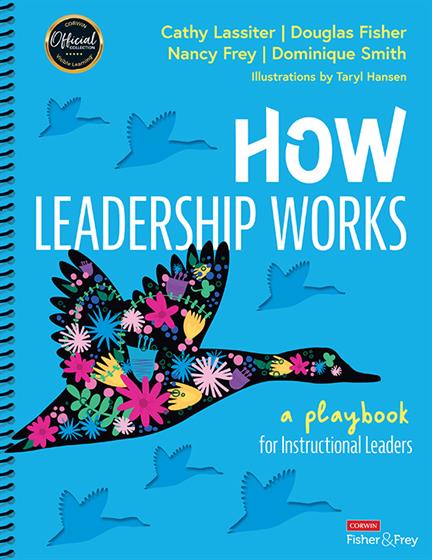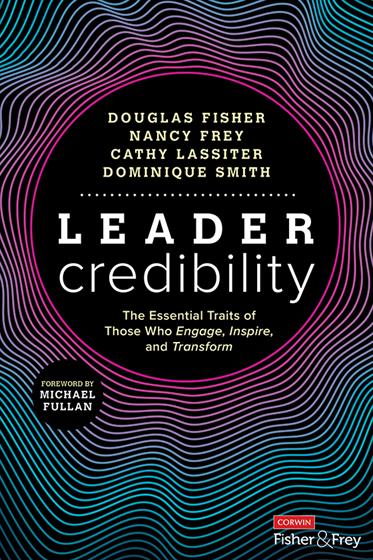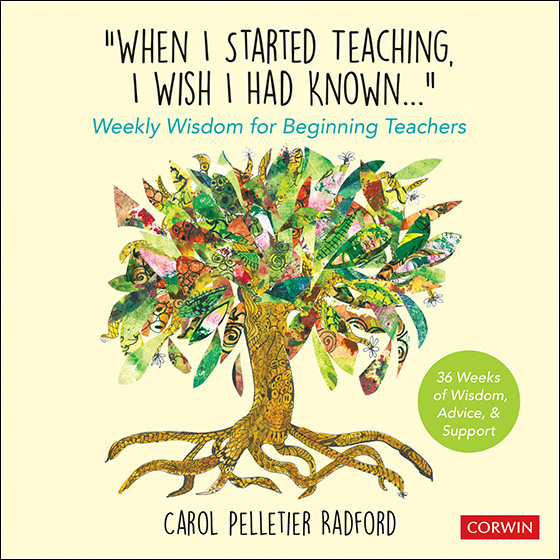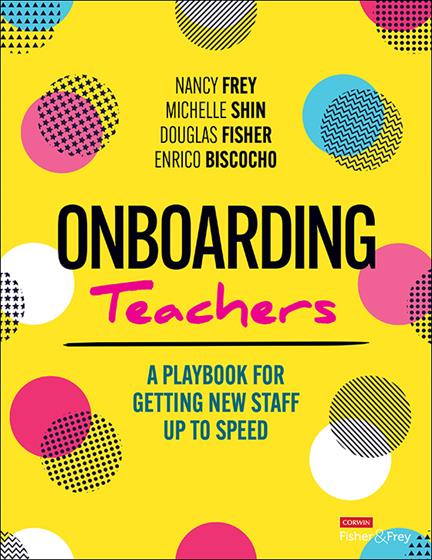Series 6 Leaders Coaching Leaders Podcast
[00:00:00.68] ANNOUNCER: Welcome to Corwin's Leaders Coaching Leaders
podcast with host, Peter Dewitt. This podcast is from education leaders for
education leaders. Every week, Peter and our guests get together to share
ideas, put research into practice, and ensure every student is learning, not by
chance but by design.
[00:00:20.13] TANYA GHANS: Peter, [INAUDIBLE].
[00:00:21.93] PETER DEWITT: Tanya, I know. I'm so excited. How are you?
[00:00:25.05] TANYA GHANS: I'm good. How are you?
[00:00:26.37] PETER DEWITT: I'm doing well. It is good to see you again.
[00:00:30.27] TANYA GHANS: You too. It's always so quick, yet, so long.
[LAUGHS] But I'm--
[00:00:35.79] PETER DEWITT: [INAUDIBLE]. The summer is behind us. And--
[00:00:39.06] TANYA GHANS: Yeah.
[00:00:39.51] PETER DEWITT: And here we are with another season of Leaders
Coaching Leaders.
[00:00:44.34] TANYA GHANS: Yeah, I'm excited, especially for when the
seasons fall towards the beginning of the school year, because I know, there's
so many educators who are just looking to get started on the right footing. And
I'm glad that we can be a part of that in whichever way we can.
[00:01:00.60] PETER DEWITT: For sure. And this first episode is really
important to all of that because first of all, it's Doug Fisher and Nancy Frey.
And they always are a good conversation. I don't like to call it interview. I
don't know. I don't feel like it's an interview. I feel like it's a
conversation.
[00:01:18.30] TANYA GHANS: It is. It's more like a conversation with you. I
agree.
[00:01:21.32] PETER DEWITT: And they're just-- and they're so good. But
their new playbook is focused on onboarding teachers. Playbook for getting new
stuff up to speed. So kicking off the Leaders Coaching Leaders podcast with
this, and then of course, knowing that it's the beginning ish of a school year
for lots of people from across the country. But regardless of whether-- when
people listen to this episode, what they're offering is really important. So
yeah, it's-- I think people are going to really enjoy this conversation that we
had. We covered a lot of ground.
[00:01:52.37] TANYA GHANS: We did. And I agree again. So September is coming
up. August is really-- for some people, it's already started. And if you are a
person in any position of having to onboard not just new teachers as they make
the distinction clear, but anybody who's new to your site, I think all of us
who have been in this field know what that can feel like.
[00:02:11.74] If you're the person who's new, and if you want to know how to
make that first impression right, because it's so important, if you want to
know how to offer the right stuff at the right time, if you want to help retain
your teachers, if you want to nurture teachers, this is an episode that's going
to give you, I think, some really good morsels on how to start that off right.
So I'm really excited about that for our listeners.
[00:02:38.51] PETER DEWITT: Yeah. And one of the-- one of the things that I
appreciated about the interview that people will hear is that I think the
topic-- or the way they're covering the topic is both a reaction, but also,
it's about being proactive to an issue that we're seeing worldwide.
[00:02:57.16] And I know that if you're a teacher or a school leader or an
instructional coach somewhere, you might think, wow, we have a really difficult
time getting teachers. But this is a worldwide issue. I'm on a LISTSERV for
Australia. And John Hattie's been putting in some research there into the
LISTSERV. And they're having a huge issue retaining teachers.
[00:03:20.06] So this playbook, I think, is really necessary in a few ways
because it helps people understand what they should be doing. [INAUDIBLE]
whether they're new to the profession or new to the school that they're in.
[00:03:33.91] So I appreciate the fact that they've taken on this topic in a
playbook sense. And people-- listeners will hear them talking about the fact
that there's a companion site for Corwin, where you can get videos, and short
articles, and PowerPoint presentations that you can adapt.
[00:03:50.62] So listen to Nancy actually answer me about that because I
think that's a really multimedia approach, which doesn't surprise me with Doug
and Nancy.
[00:03:58.91] TANYA GHANS: Yeah. Yeah. So happy listening, everyone. We
think we're going to-- you're going to get a lot out of this. And as always, we
will see you on the other side.
[00:04:07.60] [MUSIC PLAYING]
[00:04:11.52] PETER DEWITT: Doug Fisher, Nancy Frey, welcome to the Leaders
Coaching Leaders podcast. I feel like I should say "again."
[00:04:19.17] NANCY FREY: Thanks so much, Peter. We are always happy to join
you with this.
[00:04:23.16] PETER DEWITT: We always--
[00:04:23.85] DOUGLAS FISHER: Always a great conversation. We always have
such great conversations. Thank you.
[00:04:27.78] PETER DEWITT: Well, we always want you to be a staple for
every season. So I feel like we can't have a season without Doug and Nancy on.
[00:04:35.07] Congratulations. I know that you've had a few books, but the
newest one to me is really intriguing because it focuses on onboarding
teachers. And it's a playbook. So a playbook for getting new staff up to speed.
And this is hugely important for a variety of reasons that I'd like to be able
to get into. But first and foremost, what brought you to writing this
particular playbook?
[00:05:01.02] DOUGLAS FISHER: Well, the number of new teachers in our
profession right now is staggering. And welcome to them. How awesome that
people are choosing to come into teaching? And we don't want them to go away.
We want them to stay, and feel amazing, and supported, and have strong
efficacy.
[00:05:18.73] And we realized that these school systems are working really
hard on induction programs. And there's some really good induction programs out
there. But it is that site level support, that onboarding that we have to
improve.
[00:05:33.32] NANCY FREY: I think that also reflects some generational
change as well. A lot of the teachers who are new to the field are of a younger
generation. And they expect, and rightly so, they expect that their experiences
coming into a profession are going to be a bit different.
[00:05:53.06] And as Doug noted, there are great induction programs that are
out there that certainly have a proven effect. But there's also a gap in terms
of that daily kind of connection that a new teacher has at the site level to
mentors and to school leaders. And we hope to be able to fill that gap,
especially in being able to support those and welcome those new teachers from
the very beginning.
[00:06:22.67] PETER DEWITT: Yeah. I think you both are very kind to say that
there's some really good induction programs out there. And I agree with you.
But I think there are far many that teachers just come in, they get the keys to
the classroom, and they're left to their own devices.
[00:06:37.29] I was-- I remember when I was a brand new teacher, I had a
mentor. I-- many times, I felt worse leaving the mentor meeting and going into
the mentor meeting because I felt like, oh, my gosh. There are just all these
things to do.
[00:06:51.12] And Doug, I think you also said it really best when you said,
we've got all of these new teachers coming in. Is there a part of the playbook
where-- because I think it's a-- that's why I think this is such an interesting
topic because this is something that is coming up in so many conversations that
we are in. And it doesn't matter where we are in the world either. I just did a
webinar for Australia last night. And it actually came up. It's a huge issue.
[00:07:15.64] So are you hoping this book is both, let's do this right for
when they're coming in, and maybe this is an unfair question, let's make sure
we're doing the right things so they don't leave. But you're also acknowledging
at the same time that we have a teacher attrition problem that we have to do
something about. Is that-- are these all the things that played into it when
you guys were looking-- when you were both writing this?
[00:07:39.27] DOUGLAS FISHER: Yeah. So once you hire someone, and you bring
this person in, how will you support them? And yes, when our-- in our initial
teacher preparation programs, we learn stuff. But it's in the actual practice
of my classroom where I refine it, I grow, I become much more of a
professional.
[00:07:56.37] You-- all three of us could talk about our first years, and
the mistakes we made, and the grace we were given, and the support we were
provided. The numbers get a little overwhelming to site administrators right
now. They get-- I have nine new teachers or I have 50% new teachers. One
principal I was talking to last week said 80% of her staff are new this year.
And I'm like, 80%. My gosh. So that's a lot.
[00:08:21.30] And if you don't really nurture them, and they're not feeling
good about their work, like you were just saying, Peter, they're going to
leave. And then next year, we're going to have a whole bunch of new ones and
try to save them.
[00:08:33.18] And we want people to feel great about this career. We want
people to feel like, I made the right choice. I am impacting lives. And I'm
reaping the moral rewards of teaching. I have great relationships with
students. I'm watching them grow. And I feel really good about that.
[00:08:51.89] PETER DEWITT: I see this as a really great resource for those
induction programs already. But I'm going to, Nancy, throw it to you in a
little bit of a different way.
[00:09:01.87] So we all work with school leaders everywhere. And we know
that a lot of them, maybe even those that are listening to the podcast, are
going to say, we don't have an induction program. We're a small rural school,
and I've got five new teachers, or we're a larger school, but we still don't
have an induction program.
[00:09:22.38] Could you walk us through a little bit about, what do you
foresee where the playbook is concerned? How could a principal and their
teachers use it? Because I know that you both do such a great job with the
playbook. How do you see a principal and teachers using this as a way to help
bring those new teachers in and support them when they don't have an induction
program?
[00:09:49.37] NANCY FREY: And Peter, I appreciate, first of all, the
acknowledgment that there are schools that have different structures that are
in place. We didn't create this book, as you noted, only with principals in
mind, because we recognize that at lots of schools, the leadership around new
teachers may fall to a particular mentor. There may be an instructional coach.
So we wanted to really broaden the playing field in terms of who could have
access to that.
[00:10:21.17] Now what we've done with the onboarding playbook is to really
be able to parcel it out in terms of the flow of the school year. So roughly
speaking, on about a monthly basis, there's a particular spotlight on an idea.
It's important for new teachers that to the best of our ability, we make sure
that they don't feel like they're drinking out of a fire hose, right?
[00:10:51.21] So we've taken this monthly approach for those leaders or
mentors to be able to do. And there's a single focus for that. Within that
focus, we encourage mentors and leaders to be able to reflect back on what the
expectations are at the school site around that particular idea, as well as to
reflect on what was it like when I was coming into the field, what were some of
those challenges that were happening.
[00:11:24.18] In addition, we've got places in the playbook that the mentor
or leader can use to be able to talk about things like particular video
spotlight with a guide around how to watch that video clip. There are materials
that are put together in the form of PowerPoints and so on that are related to
that idea so that coaches, mentors, principals can pick that up and utilize
that within a short meeting format as they get together with their teachers.
And then lots of opportunities for reflection to be able to take place.
[00:12:08.19] And the reflections at the end of each module also tie back in
to what were some of the previous learnings from previous modules. We want to
make sure that we're not saying, hey, for four weeks, we're going to pay
attention to high expectations teaching and then never come back to it again.
So we're inviting them to always be folding in what it is that they have
learned and continue to learn as they take on a new concept, a new idea.
[00:12:37.95] PETER DEWITT: I--
[00:12:38.16] DOUGLAS FISHER: And so if I may add one thing to that, Peter.
Nancy, could you add about the web space the portal that Corwin built to
support people, that ties into each of the cycles in the playbook?
[00:12:52.47] NANCY FREY: Yeah. There-- and thanks for the reminder for
that, Doug. There's a whole portal that's put together that have a number of
different additional kinds of materials that are available. I talked earlier
about having PowerPoints that are related to that, that are already put together,
that leaders are free to be able to customize to their particular context.
[00:13:17.82] We've got short readings that are in there that can be used
for the leader, that can be used for the mentor, and can be used for that new
teacher as well. And they're short readings. I really want to be able to
emphasize that.
[00:13:35.43] The idea around the portal in particular is being able to have
a space, a digital space that is a container, if you will, also divide it out
according to each of those modules so that leaders can pull from lots of
existing material, and they don't have to sit there and think to myself, oh, my
gosh, I've got a meeting tomorrow. And it's 8:30 at night. And now I need to
put something together. We've got that for you to be able to use.
[00:14:06.25] PETER DEWITT: I love that because one of the powerful things
that you both have done over the years is you have your column with educational
leadership. And that-- so when you say short readings, it made me think exactly
of that because I remember, I used to use, and still use from time to time, the
column you wrote on the jigsaw method and had the video with it. So those are
perfect example of what you're talking about.
[00:14:30.43] And also, Nancy, what you got me to think about, actually, is
I was a little bit critical of my mentor when I became a new teacher, because I
was like, he made me feel worse when I left. You just made me realize that
maybe he just didn't know what being a mentor meant. Maybe he was told by the
principal or whoever, you're going to work with this new guy. And meet with him
on a weekly or monthly basis.
[00:14:52.96] And it sounds like the playbook is a really great resource for
mentors who don't have that clear understanding of what their job is, to actually
gain that clear understanding of what their job is. And I think that I like
that dual purpose, actually. So it's not just the onboarding for a new teacher
to be looking at. It's also really important for a mentor or like you said, an
instructional coach to look and say, here are the things to be able to think
about.
[00:15:19.49] What's the-- so talk to me about-- I know you were doing this
every-- you had the spotlight every month. But what's the first chapter like?
I'm dying to know what Doug and Nancy think is the most-- I really do. Because
as writers, your first chapter, like that's that idea that's going to grab
people. So what does the first chapter actually focus on?
[00:15:43.82] NANCY FREY: Well, we really tried to take a bit of a
time-based approach to this as well. So the very first module is, how are you
planning for that first day of school? We know that many schools have at least
a few days set aside in their calendar for that teacher planning. And it can be
really easy to overlook that new teacher who's wandering the halls and going,
oh, my gosh, where are my keys? All of those sorts of things.
[00:16:12.72] So that very first module is around how it is that we support
those teachers that are either new to the profession or I want to point out,
new to the site. In many cases, we've got experienced teachers who are new to
the site or new to the district, they deserve support as well.
[00:16:32.26] So in that very first module, how are you going to make sure
that your first effort is your best effort in being able to welcome them into
your site?
[00:16:43.26] DOUGLAS FISHER: We also-- moving on from that orientation,
welcome, that kind of stuff, the first big content we move into is about
engagement. How do you set up your classroom to invite students in the
learning? How are they feeling welcomed into the classroom? How are they
feeling valued in that classroom? How are they being taught what it means to
engage rather than expecting that someone before you got them to engage?
[00:17:10.68] And then as Nancy was saying, we cycle through a bunch of
topics, high expectations teaching. Eventually, we move into things like, how
do you know your students are learning? Because when we get the new teacher
just recognize, I am having an impact on these learners, and they are learning,
they are way more likely to stick with us. Because that's why they signed up
for this job. They want to see learning happen.
[00:17:32.17] PETER DEWITT: So I feel like this book is both reactive and
proactive to a problem that we're facing. Why do you think we have such a
teacher attrition problem? I know that there are a variety of reasons.
Sometimes-- or many times, I have thought it is about the public rhetoric
around education, in general. But why do you think we're having such an issue
with people getting into the teaching profession in the first place?
[00:18:04.03] I mean, we've all heard-- we've been around for a while. We've
all heard that people leave the profession within five years and that kind of
stuff. But it just seems like it is a much more gigantic issue now than it was
before COVID. Why do you think that is?
[00:18:18.78] DOUGLAS FISHER: I do agree with you. Part of the-- part of the
attrition problem is this public rhetoric. It's less respected and valued
position. I'm shocked at how many people, when surveyed, if they're a teacher,
do they recommend their own children go into teaching? That number is dropping
and dropping and dropping. And both Nancy and I had family members who were
teachers. And we were socialized into that. And imagine if they had said, don't
pick this career. Don't do this. It's a terrible. I mean, who knows?
[00:18:47.05] I think that's a part of it. I think the pressure from the
politics, and boards, and this very strong like, I want my kids only to have
these experiences is contributing to some teachers leaving. And I think the
pandemic made a number of people question how they spent their time. And I
think that all came together.
[00:19:09.94] And some of the resignation culture that occurred across--
after the school closures was not limited to education. It was widespread
industries. And people saying, you know what? I don't want to spend my life like
this. I want to do other things. So I think all of that came together.
[00:19:28.75] We are seeing some resurgence. There are some teachers who are
really saying, I made it through. I'm feeling really good. Things are happening
in my school in positive ways. I really like this. We're just a little short.
[00:19:41.95] I saw a report that there's 950 openings in one area. And so
we still have places where we have to recruit. And I'm hoping our society
invests in getting people, young people to say, I want to be a teacher, whether
it's through the university programs or through districts. How do we encourage
young people to say, you know what? This is a viable career for me. I really
want to do this.
[00:20:07.64] PETER DEWITT: Yeah. For me, it was life changing. I mean-- and
I agree with you. I remember when I was-- I'm the youngest of five, and the
first to go to college. So when I became a teacher, my mom talked about me like
I was one step closer to God because I'm a-- she always introduced me that way.
There was a sense of pride.
[00:20:23.03] But I had a friend whose mom was a PhD at a local university.
And when he wanted to get into teaching, she was really negative about it. And
I just kept really thinking-- back then, because I was young, I was thinking,
why? Why would she do that? That's so odd. Over the years, I have heard that
story more and more. And to me and to the two of you, teaching has changed our
lives. It certainly has for me.
[00:20:51.05] DOUGLAS FISHER: Right.
[00:20:51.77] PETER DEWITT: What do you-- so I'm feeling like it's the whole
package because it is multimedia, which doesn't surprise me from the two of
you. So you've got the playbook, which we know is very user-friendly. And
people can open it up and just jump in.
[00:21:08.25] And now you've got the companion website, where you've got
PowerPoint presentations that they can download and adapt. You've got videos
that they can do. They've got short videos that they can look at. What is
something that I didn't ask that you wish that I did during this podcast?
Because I know how your brains work. And you're always going.
[00:21:29.10] So talk to me a little bit about, what did I not focus on
around this idea of onboarding and the playbook in general that you wish that I
talked about?
[00:21:39.94] NANCY FREY: So I'm not sure that it is-- that you didn't
focus, but rather, I want to reiterate a point that you had made earlier. And
that is that an onboarding process needs to be bidirectional. It isn't a more
experienced educator tells a less experienced educator what it is that they
need to do, gives them their marching orders, and off they go. But rather, that
you've got to be able to be reflective as that mentor, as that leader, about
what's working, what's not working.
[00:22:20.36] One of the features that we have at the end of each of the
modules is specifically for the leader, to be able to reflect on their
leadership over the course of the last four weeks. What were things that worked
really well for them? What were things that didn't? And what might be some
changes that you want to make over this next period of time?
[00:22:47.52] I think that always going back to being reflective for the
coach or the leader is as important as promoting that self-reflection for that
new teacher.
[00:22:58.79] PETER DEWITT: Yeah. And that's a great point because there are
leaders that, especially in workshops, will say, we don't get-- because I give
a lot of processing time. And they say, we don't always take this time to
process when we're back at school. So that's really important.
[00:23:12.65] Doug, what about you?
[00:23:14.54] DOUGLAS FISHER: I would like to acknowledge the two co-authors
as well, Enrico and Michelle, who support new teachers as a big part of their
job and their life. So they were vital in helping us think of the flow, and the
organization, and the content.
[00:23:30.50] And I'm really hoping that in the online platform that
supports this playbook, that people start to share with each other and with us
the successes they're having. I hope there's leaders talking to each other,
saying, hey, I got these five new teachers. Here's what I did with them. Here's
a PowerPoint I used. Here's a video clip I showed.
[00:23:49.28] If we can create a community to say, we need to support the
people that we are welcoming into this profession. If not, our jobs are going
to be harder. But they also just deserve it. They just deserve it because they
chose, they invested, they earned their credentials, and they deserve our
support in becoming professionals.
[00:24:08.66] PETER DEWITT: Well, that's a mic drop moment. So the book is
the ongoing-- Onboarding Teachers. A Playbook for Getting New Staff Up To
Speed. Doug and Nancy, it's always an honor to have you both on the Leaders
Coaching Leaders podcast. Thank you.
[00:24:24.29] DOUGLAS FISHER: Thank you.
[00:24:25.73] NANCY FREY: Thank you so much, Peter.
[00:24:28.13] DOUGLAS FISHER: See you next time.
[00:24:29.03] [MUSIC PLAYING]
[00:24:32.61] TANYA GHANS: And as always, Doug and Nancy, and their two
co-authors, Enrico--
[00:24:40.68] PETER DEWITT: Biscocho.
[00:24:41.87] TANYA GHANS: Biscocho. Enrico, forgive us if we've
mispronounced that. But it's all four of these authors have played a really
pivotal role in making this book happen. I believe, the latter authors are
induction experts. And I think all of it shows in this book. I mean, so you get
the great accessibility, the timely layout.
[00:25:03.32] And I really do love how-- I think, earlier on, you talked
about how this is both a preactive and a-- a proactive and a reactive kind of
book. It's responding to a need right now that teachers are-- there's just a
paucity of teachers in the field. But we also want to be proactive about
setting up teachers for success.
[00:25:25.98] And that these authors really straddle both of those well in
terms of, OK, the first day of school, when Nancy was talking about walking
around in a new building, and where are my keys? And where are my books? And
really getting in touch with that feeling and helping readers of this book, who
are going to be doing this work, remember what it's like to be that new teacher
and how disorienting it can be, I think is fantastic because you really have to
start at that place.
[00:25:51.96] And yet, they still also get to a place of talking about, how
do we make sure that we're giving new teachers, new staff opportunities for
success in seeing learning in their students year one because we know that once
people get a taste of success and feel good about what they're doing, there
really isn't anything better that fuels you sticking around, especially in
those first few years.
[00:26:21.50] PETER DEWITT: Yeah, it's such an exciting time when you're
starting the school year, whether you're a new teacher or new to a building
too. So this is a good resource.
[00:26:30.90] And what I also-- when Nancy was talking in the conversation,
I had mentioned a critical view of the mentor I had when I was a brand new
teacher. And there was something that she said that made me think, oh, maybe
it's possible that the mentor really, what is my role? Nobody's ever given me
any professional learning around what I'm supposed to do. I'm just making it up
as I go along.
[00:26:56.43] So this resource, this book, the playbook is really good for
them too to start to sketch out, what does my role look like if I'm an
instructional coach or I'm a veteran teacher who is working as a mentor? But--
and also, the principal's role in it, I think, that, to me, is really good
because I think a lot of people might leave the principal out of it, or they
might make the principle more of the-- this is the administrator kind of thing.
[00:27:23.03] But what they seem to have done within the book is they've
given space for that leader to be self-reflective about, how did you spend the
last month? How did you engage? What kind of things did you do? And that's just
really good modeling.
[00:27:36.79] So yeah, I appreciate this playbook. It-- to me, I think it's
a great resource for people.
[00:27:42.22] TANYA GHANS: Yeah, it's so pivotal. And I think you're right.
It's one of those things where if you're the coach or the principal or a school
leader, it can be so easy to be thinking about all of the other things you have
to get done because frankly, this is not going to be your only job, likely,
you're going to be doing lots of things, that it can be the kind of thing you
put together a little too hastily, just because of the many hats that you wear.
And I think a resource like this can only be helpful in helping just being more
intentional and deliberate with something that is clearly pivotal.
[00:28:12.85] So I'm glad this is our opening episode for this season. I
think it's fantastic.
[00:28:20.93] PETER DEWITT: Me too. It was a great conversation. So thank
you to everybody for listening. As always, we say this every season and every
episode, give us feedback. What do you like about the show? And make sure
you're giving us our likes and everything that we need. But--
[00:28:35.54] TANYA GHANS: [LAUGHS]
[00:28:37.07] PETER DEWITT: I have to tell you, Tanya, when I'm on the road,
I hear from people that will say, oh, we always listen to the Leaders Coaching
Leaders podcast. And they take it with them when they're going for a run or
when they're in their car, and their commuting back and forth to school and
stuff or they're out for a walk. So we're honored to be a part of whatever
journey they're on.
[00:28:57.39] TANYA GHANS: Completely. Completely agree. And Peter, it is
always fantastic learning alongside of you.
[00:29:02.25] PETER DEWITT: Always good to see you, Tanya. Until next time.
[00:29:04.23] TANYA GHANS: Yes. All right. We will see you next episode.
Take care, everyone.












